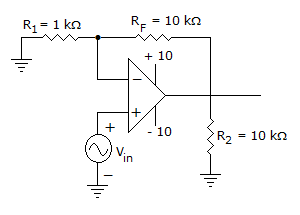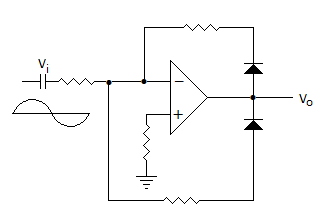ECE :: Analog Electronics
-
The purpose of using negative feedback in a op-amps is to
-
A transistor amplifier with 85% efficiency is expected to be
-
In the case of the circuit shown in the figure Vio = 10 mV dc maximum, the maximum possible output offset voltage Voo caused by the input offset voltage Vio with respect to ground is

-
The advantage of transistor over vacuum tube is
-
Which of the following is necessary transistor action?
-
An op-amp is fed from a signal source through resistance R1. If it is to work as sign changer, the feedback resistance Rf should be
-
For a sinusoidal input, the circuit shown in the figure will act as a

-
A multivibrator can be used as a
-
A multivibrator generates
-
The derating factor, for ambient temperature higher than specified, for a transistor is about


 Whatsapp
Whatsapp
 Facebook
Facebook

